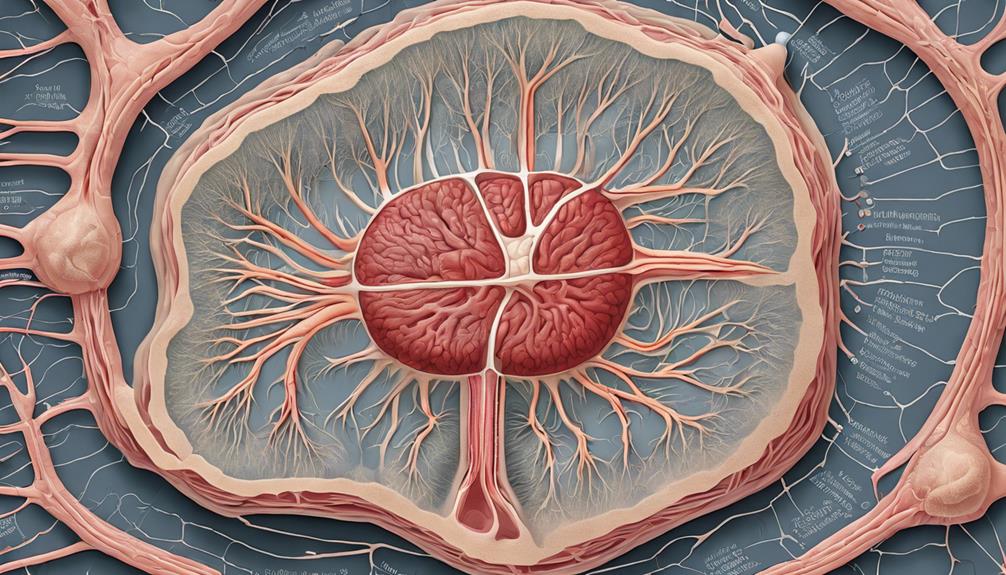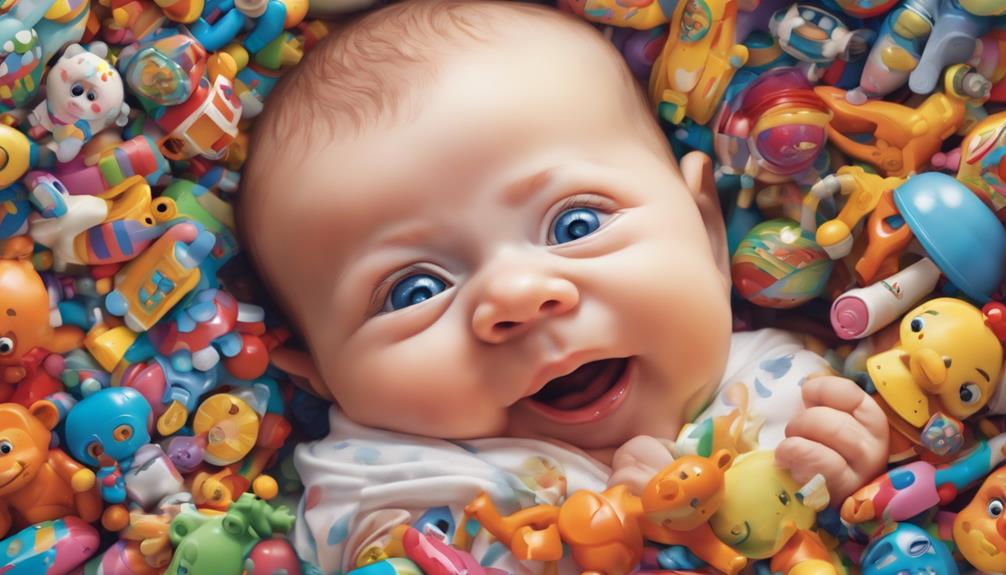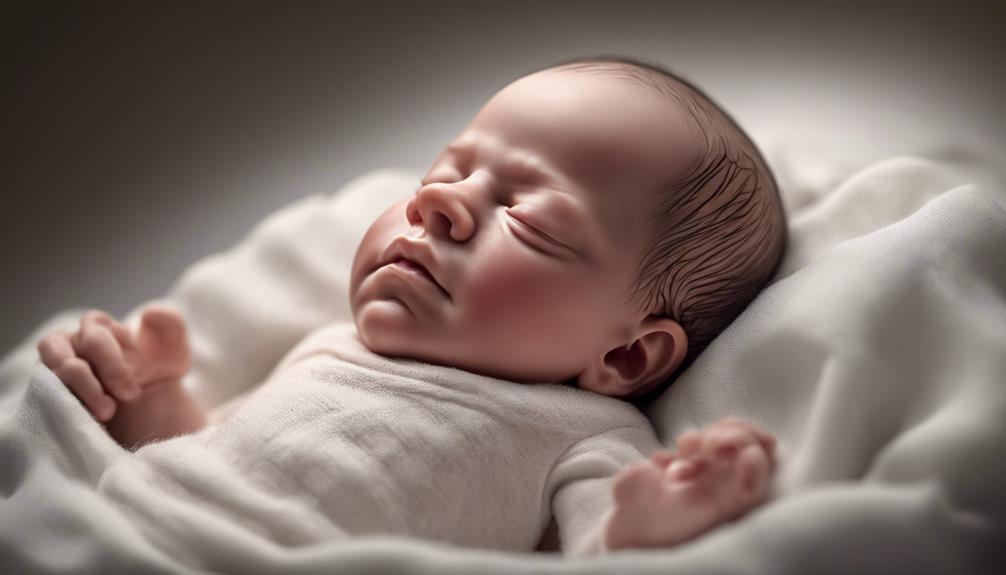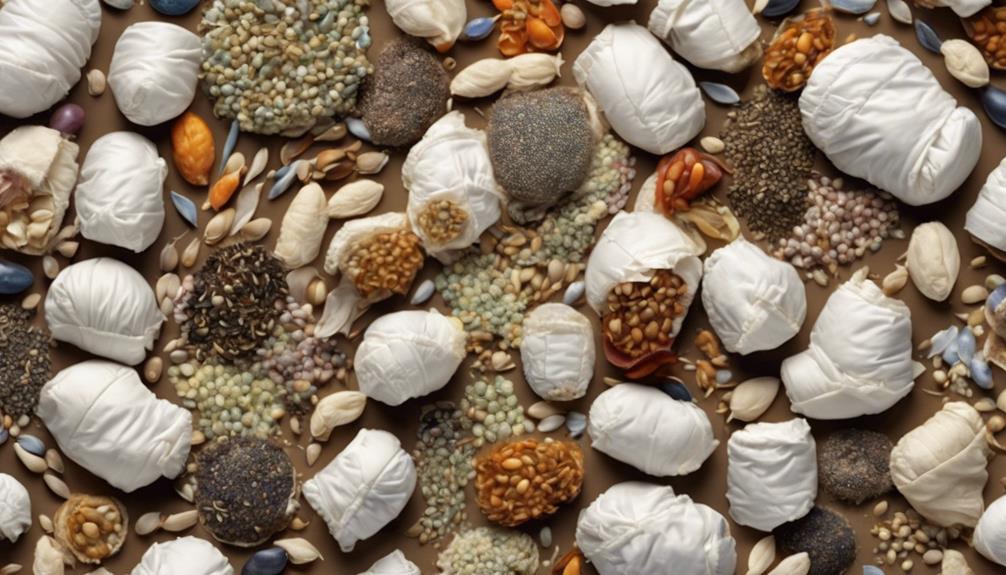When your newborn's tiny body is constantly punctuated by those little hiccups, it might seem like an inconsequential occurrence, but could there be more to it? Understanding the underlying reasons for this common phenomenon can provide insight into your little one's well-being and offer ways to alleviate their discomfort.
From feeding habits to physiological development, each hiccup holds a clue to your baby's health. Let's uncover the mysteries behind why your newborn is experiencing these persistent hiccups and what you can do to help.
Key Takeaways
- Newborn hiccups are often due to immature nerve pathways and reflex responses.
- Prevent hiccups by establishing a calm feeding environment and avoiding overfeeding.
- Swallowing air during feedings contributes to hiccups; use proper burping techniques.
- Understand that hiccups should decrease as your baby's neurological and digestive systems mature.
Feeding Patterns
If your newborn is experiencing frequent hiccups, the way they feed could be a significant factor to take into account. Babies have delicate digestive systems that can be easily overwhelmed, leading to hiccups. Paying attention to their feeding patterns is important in addressing this issue. Fast or enthusiastic feeding behaviors can trigger hiccups in newborns, as well as overfeeding or gulping air during feeds. Establishing a regular feeding schedule and creating a calm and unhurried feeding environment to minimize hiccups is vital.
Additionally, inefficient latching or improper bottle feeding techniques can also contribute to your baby's hiccups. Taking the time to ensure a proper latch or choosing bottles that reduce air intake can make a significant difference. Also, inadequate burping during and after feedings can lead to trapped air in your baby's stomach, resulting in more frequent hiccups. By adjusting these feeding habits, you can help alleviate your newborn's hiccups and promote more comfortable feeding experiences.
Immature Nervous System

With an immature nervous system, newborns may experience frequent hiccups due to the ongoing development of their neural connections and reflex responses. In newborns, the nerve pathways responsible for coordinating breathing and swallowing are still developing, which can lead to hiccups. The immaturity of the nervous system in babies can cause the diaphragm to spasm, which then causes the vocal cords to close suddenly, resulting in hiccups.
It is important to understand that hiccups in babies are often a normal part of their neurological development process. The occasional misfirings in the nerve signals during this development phase can trigger hiccups. As your baby's nervous system matures, you may notice a decrease in the frequency of hiccups. While these hiccups can be concerning for parents, they're usually harmless and tend to resolve on their own.
Swallowing Air
If your newborn frequently hiccups, it could be due to swallowing air during feedings. The rate at which your baby feeds might impact how much air they swallow, leading to more hiccups.
Ensuring effective burping techniques could help reduce hiccups by minimizing the air swallowed.
Air Swallowing Frequency
Swallowing air during feeding can contribute to the frequency of hiccups in newborns. Confirming a proper latch while breastfeeding or using anti-colic bottles can help reduce the chances of your baby swallowing excess air. Additionally, feeding your baby in a more upright position can aid in minimizing the intake of air during feedings. Here is a table highlighting some key strategies to reduce the air swallowing frequency and help alleviate your baby's hiccups:
| Strategies to Reduce Air Swallowing Frequency |
|---|
| Confirm a proper latch during breastfeeding |
| Use anti-colic bottles |
| Feed your baby in an upright position |
| Burp your baby frequently during feedings |
| Avoid feeding your baby too quickly |
Feeding Techniques Impact
To help reduce the frequency of hiccups in your newborn, adjusting feeding techniques to minimize air intake is crucial. When feeding your baby, consider the following to help prevent hiccups:
- Hold the bottle correctly: Ensuring the bottle is tilted correctly can reduce the amount of air your baby swallows.
- Choose the right nipple size: Opt for a nipple size that suits your baby's feeding pace to prevent gulping excess air.
- Monitor breastfeeding positions: Proper latch and positioning can help prevent your baby from swallowing air, reducing the likelihood of hiccups.
Burping Effectiveness Correlation
To guarantee effective burping, concentrate on releasing trapped air in your newborn's stomach to prevent hiccups. Newborns often develop hiccups when they swallow air during feeding, particularly if burping isn't done correctly. Inefficient burping can lead to air pockets in their stomach, triggering these uncomfortable hiccups.
Overfeeding
If your newborn is experiencing frequent hiccups, overfeeding may be the culprit, leading to stomach distention and discomfort. Being mindful of your baby's feeding patterns to guarantee they're comfortable and content. Here's how overfeeding can contribute to those persistent hiccups:
- Stomach Distention: Overfeeding can stretch your baby's stomach beyond its comfortable capacity, causing discomfort and triggering hiccups.
- Excess Air: When your newborn feeds too quickly or gulps air along with milk, it can lead to excess air in the stomach, resulting in hiccups.
- Proper Feeding Techniques: Making sure you're employing proper feeding techniques, such as holding your baby in an upright position and pacing the feedings, can help prevent overfeeding and reduce the occurrence of hiccups.
Temperature Changes

When it comes to your newborn experiencing hiccups, temperature changes can play a significant role. Moving your baby from a warm to a cooler environment or giving them cold milk during feeding may trigger hiccups.
To help confirm this, make sure the room temperature is comfortable, keep your baby swaddled for warmth, and shield them from sudden drafts or chilly air.
Room Temperature Impact
Maintaining a consistent room temperature is essential to minimize the occurrence of hiccups in newborns, as sudden temperature changes can trigger discomfort and diaphragm irritation. When the room temperature fluctuates, your newborn's delicate system may respond with hiccups.
To create a comfortable environment for your little one, consider the following:
- Set the room temperature to a moderate level to prevent sudden shifts.
- Use a thermometer to monitor the room temperature regularly.
- Avoid extreme cold or heat conditions that can lead to more frequent hiccups.
Swaddle for Warmth
Ensuring your newborn is snugly swaddled can help stabilize their body temperature, reducing the likelihood of hiccups caused by sudden changes in temperature. Newborns have a limited ability to regulate their body temperature, making them more susceptible to hiccups due to temperature fluctuations.
Swaddling provides a cozy and secure environment for newborns, minimizing exposure to cold air and potential triggers for hiccups. By keeping your baby comfortably warm through swaddling, you can prevent hiccups associated with exposure to drafts or cold environments.
Proper swaddling techniques create a snug and warm environment that promotes relaxation and reduces the occurrence of hiccups in newborns. Remember, a well-swaddled baby is a happy and hiccup-free baby!
Avoid Sudden Drafts
To shield your newborn from unnecessary hiccups, be mindful of abrupt changes in temperature that can agitate their delicate diaphragm, particularly by avoiding sudden drafts.
- Sudden drafts or temperature changes can irritate a newborn's diaphragm, leading to hiccups.
- Newborns are more sensitive to temperature fluctuations, making them prone to hiccups from sudden drafts.
- Protecting your baby from sudden drafts can help reduce the frequency of hiccups they experience.
Keeping your baby away from sudden temperature shifts is crucial in maintaining their comfort and health. By being cautious and attentive to temperature changes, you can create a more peaceful environment for your little one and minimize the chances of them experiencing bothersome hiccups.
Acid Reflux

If your newborn is experiencing frequent hiccups, it might be due to acid reflux, also known as gastroesophageal reflux disease (GERD). GERD occurs when stomach acid flows back into the esophagus, causing irritations that can lead to hiccups. Newborns with GERD may also exhibit symptoms like spitting up, fussiness, and difficulties during feeding. These hiccups can be bothersome for both you and your baby, but managing GERD can help reduce their frequency and improve your little one's overall comfort.
To address acid reflux in your newborn, consider feeding them smaller amounts more frequently, burping them after feedings, and keeping them upright for about 30 minutes after eating. Additionally, avoid tight clothing around their abdomen and try to minimize disturbances during feedings. If you suspect that acid reflux is the underlying cause of your baby's persistent hiccups, it's crucial to consult a healthcare provider for proper evaluation and guidance on managing GERD effectively. Your baby's well-being is paramount, and seeking professional advice can provide you with the support and reassurance you need during this challenging time.
Stress and Excitement

When dealing with newborn hiccups triggered by stress and excitement, creating a soothing environment can greatly reduce their occurrence. Newborns are sensitive to their surroundings, and feelings of stress or excitement can lead to spasms in their tiny diaphragm muscles. To help your little one through these moments, consider the following:
- Stay Calm: Your newborn can pick up on your emotions, so creating a calm and peaceful atmosphere can help them relax.
- Limit Stimuli: Loud noises or sudden changes in the environment can add to their stress. Keep their surroundings quiet and gentle.
- Establish Routine: Having a predictable routine can help reduce your newborn's anxiety levels, ultimately leading to fewer hiccups.
Positioning During Feeding
Position your baby in an upright position during feeding to help reduce the likelihood of hiccups by preventing air intake. By ensuring your little one is upright while feeding, you can minimize the chances of excess air entering their system, which often leads to those pesky hiccups.
Using a feeding pillow or holding your baby at a slight angle can further aid in proper digestion and decrease the occurrence of hiccups. It's important to keep your baby's head slightly elevated during feeding as well. This position helps control the flow of milk, preventing it from coming too quickly and potentially triggering hiccups.
Avoiding feeding when your baby is lying flat on their back is also important in reducing the chances of hiccups during or after meals. Remember, proper positioning not only helps prevent hiccups but can also lower the risk of spit-up and reflux, common issues that often accompany hiccups in newborns.
Diaphragm Irritation

Irritation of the diaphragm, an important muscle for breathing, is a common cause of hiccups in newborns. This irritation can lead to involuntary contractions, resulting in the characteristic hiccup sound. Factors like eating too quickly, having a bloated stomach, or experiencing the Tonic Neck Reflex can trigger hiccups in your little one.
To help alleviate these hiccups, consider the following:
- Burping: Gently pat your baby's back to encourage burping, which can release trapped air and potentially reduce hiccups.
- Offering a pacifier: Sucking on a pacifier can sometimes help regulate your newborn's breathing pattern, calming the diaphragm.
- Changing positions: Moving your baby into a different position, such as holding them upright against your shoulder, can aid in relieving diaphragm irritation.
Underdeveloped Digestive System
Your newborn's hiccup episodes could be linked to their underdeveloped digestive system. Due to the immaturity of their diaphragm and esophageal sphincter, hiccups can occur more frequently.
Their limited ability to regulate swallowing and the reflexes controlling hiccups may also play a role in these episodes.
Digestive System Immaturity
Newborns often experience frequent hiccups due to their underdeveloped digestive system, which can make their diaphragm particularly sensitive. This sensitivity is a result of their immature digestive system, causing hiccups to be a frequent occurrence as they adjust to feeding and digestion.
The immaturity of their gastrointestinal tract plays a significant role in the continuous hiccuping you may notice in your baby. It's important to understand that as their digestive system continues to develop, these hiccups should decrease over time.
Hiccup Triggers in Newborns
If your newborn is experiencing frequent hiccups, it may be due to their underdeveloped digestive system triggering these episodes. The causes of hiccups in newborns are often linked to their immature diaphragm, which can easily spasm, leading to these common occurrences.
Additionally, swallowing air while feeding or overfeeding can irritate the diaphragm and exacerbate hiccups. To help get rid of baby hiccups, try burping your infant more frequently during feedings to release trapped air. Ensuring a calm feeding environment and feeding at a slower pace can also reduce the likelihood of hiccups.
Frequently Asked Questions
Is It Normal for My Newborn to Have Hiccups All the Time?
Yes, it's normal for your newborn to have hiccups frequently. Their developing diaphragm muscles can cause this, and it's a common occurrence. Usually harmless, these hiccups are part of their body adapting to breathing and digestion.
How Do I Stop My Baby From Having Hiccups After Feeding?
After feeding, burp your baby and guarantee they stay upright for 20-30 minutes. Try paced bottle feeding and proper latch techniques to reduce hiccups. Avoid overfeeding by offering smaller, frequent meals. Patience and these steps will help ease your baby's discomfort.
Is It OK to Lay Baby Down With Hiccups?
Yes, it's okay to lay your baby down with hiccups. Hiccups are common in newborns and don't typically pose a risk. If hiccups persist or cause concern, consult your pediatrician for guidance and reassurance.
Is It Normal to Feel Baby Hiccups Everyday?
Feeling baby hiccups every day is normal. Newborns' developing diaphragms make hiccups common. They're harmless and usually resolve on their own. No need to worry; it's just a natural part of your baby's growth and breathing process.
Conclusion
To sum up, understanding the reasons behind your newborn's frequent hiccups can help you manage and prevent them effectively. Remember, hiccups are a common occurrence in newborns and usually resolve on their own.
By following proper feeding techniques, burping your baby regularly, and consulting with a pediatrician if needed, you can make sure your little one stays comfortable and healthy.
So, don't fret over those hiccups – they're just a small hiccup in the grand scheme of things!








